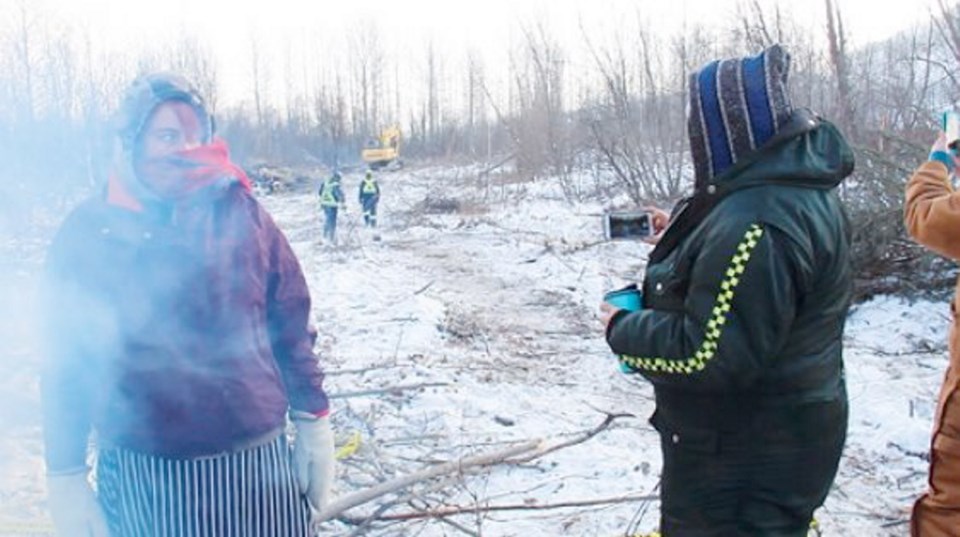B.C. Hydro is taking legal action against campers blocking Site C dam construction on the south bank of the Peace River.
The Crown utility filed a civil claim in B.C. Supreme Court Tuesday against a number of individuals camped at the Rocky Mountain Fort.
"On Tuesday of this week, we filed a civil claim in relation to a small number of individuals who have been preventing contractors from safely undertaking some clearing work on the south bank of the Site C dam site," BC Hydro CEO Jessica McDonald told the Alaska Highway News Wednesday.
"It is unfortunate that we need to take legal steps, but we need to consider the interests of our customers if the project schedule and costs are affected."
The camp, upstream from the Moberly River at the site of an 18th-century fur trade fort, has been preventing logging work for more than 20 days. Campers there say they want work stopped until First Nations' court challenges against the dam are settled. Around 10 people are living in heated camp shacks there, both of which were flown in by helicopter.
The protest has earned kudos—as well as a higher profile—from environmentalist David Suzuki, as well as Union of B.C. Indian Chiefs Grand Chief Stewart Phillip.
The claim names eight people, including two identified as Jane and John Doe and "all other persons unknown to the plaintiff."
Verena Hofmann, one of the campers named in the claim, said she was aware of the civil claim but had not been served any legal documents. Ken Boon, another dam opponent and president of the Peace Valley Landowner Association, said he had been served a copy of the claim.
The claim accuses campers of "occupying, obstructing, blocking, physically impeding or delaying access" to the area around the Rocky Mountain Fort historic site. B.C. Hydro is seeking an injunction to remove the camp and block protesters from accessing the site.
The claim states B.C. Hydro will be forced to delay and modify plans for the dam's construction if the protest is not ended and logging not completed in the area by March 31. Hydro is seeking costs and punitive damages in its claim.
The defendants say the legal action has unnecessarily ramped up tensions on the south bank of the river.
"We've been nothing but peaceful and reasonable and orderly in our interactions with B.C. Hydro's contracted security people," Hofmann said. "We have not been obstructing or standing in the way or blockading things out there. It's truly astonishing they would use these pressure tactics."
Earlier this week, a group calling itself Treaty 8 Stewards of the Land released a plan calling for:
• temporary suspension of construction in the area until First Nations and landowner lawsuits are settled
• the federal government to suspend project approvals and permits until an "open and transparent review of the infringement" on treaty rights could be carried out
• the project to be reviewed by the B.C. Utilities Commission.
"These are reasonable demands the camp made known," Hofmann said, saying they were ready to meet with Hydro to discuss the issues.
Esther Pedersen, also named on the notice, said B.C. Hydro had no interest in negotiating.
"They said they wanted to talk, and this how they talk to us."
As for what happens next, another camper, Helen Knott, said the plan was to stay put.
"We are going to continue to peacefully be on Treaty 8 territory," Knott said, saying the court action is "another move up the ladder in terms of the intimidation practices we've already been facing."
As for the camp's impact on Site C's bottom line: "we are continuing to assess the costs of delay," McDonald said. Opponents argue a delay of Site C could actually save money.
The $8.8-billion dam would flood more than 80 kilometres of river valley. Construction on the project began in July.



